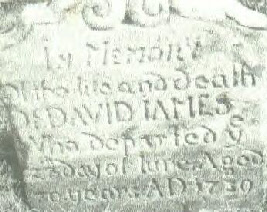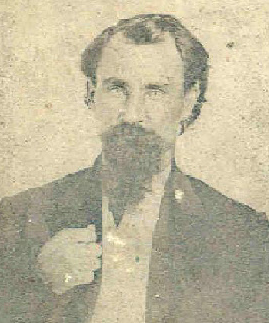
James Family Archives
• Researching the Past
• Education for the Present
• Preservation for the Future
Joel L. James (1811-
By Larry P. James
June 15, 2013

Joel L. James was born on Thursday, February 28, 1811 in Bedford County, Virginia
near the present day town of Stewartsville to Jonathan James (circa 1785-
There is no known record of Joel’s childhood but it is assumed that he grew
up on his father’s farm in rural Bedford County, Virginia. As the eldest of his
parent’s seven children Joel was quite likely required to take on a great deal of
responsibility at an early age as the heir apparent to his father’s estate. This
was customary in his time. On August 22, 1831 at the age of twenty, Joel secured
a bond in Bedford County for his marriage to Angelina Ryan (1812-
“Know all me by these presents that we Joel L James & William Ryan are held and firmly bound unto John Floyd Esq Governor or chief Magistrate of this Commonwealth. We in the just and full sum of one hundred and fifty Dollars current money of Virginia to which payment well and truly to be made, we bind ourselves & each of our heirs jointly and severally firmly by these presents sealed and dated this 22d day of August 1831. The condition of the above obligation is such that whereas there is a marriage shortly intended to be had and solemnized between the above bound Joel L. James and Miss Angelina Ryan daughter of said William Ryan. Now if there be no lawful cause to obstruct said marriage, then the above obligation to be void or else remain in full force & value.
Witness’s: Joel L James {Seal}, William Ryan {Seal}” 1
The young couple would continue residing in the vicinity of Bedford County, Virginia
for nineteen more years during which time Angelina would bear five children including:
William George James (1832-
During the year of Joel’s birth James Madison, a Republican from Virginia, was serving as the third president of the United States. The first steamboat to sail down the Mississippi reached the town of New Orleans and Jane Austen wrote her memorable novel, Sense and Sensibility. The year following Joel’s birth saw the advent of the War of 1812. And although generally unaffected by the war, by August 24, 1814 the British had occupied Washington and burnt to the ground many of the public buildings including the Capitol and the White House. The years of Joel’s childhood also saw the increase in the territory of the United States with the rapid succession of additional states to the Union: Louisiana in 1812, Indiana in 1816, Mississippi in 1817, Illinois in 1818, Alabama in 1819, Maine in 1820 and Missouri in 1821. In 1817, James Monroe was elected President of the United States and by 1823 the “Monroe Doctrine” was firmly in place. By 1836 Texas had undergone a revolution and in 1845 was admitted into the Union.
On November 27, 1843, Joel’s father Jonathan James passed away in Bedford County, Virginia. Joel was 32 years of age and already a father of four. Fortunately, Jonathan left a last will and testament providing a snapshot of the family at the time of his passing. In his will, Jonathan provided for the following:
“I Jonathan James of the County of Bedford and State Virginia being weak in body
but of sound and good mind and memory, do hereby make and ordain this my last Will
and Testament in maner and form following, that is to say -
Following the loss of his father, Joel turned his attention to the growth and expansion that was occurring to the west of Virginia. The massive expansion of the United States westward during this time was not without its effect upon the James family. In 1849 Joel and his two younger brothers, George Washington James and John James made the decision to head west into the interior of the country. Invariably, Joel’s youngest brother, Jonathan James, would remain in Virginia and likely oversee the agricultural interests of the men’s late father as well as provide care and support to their mother. The decision to head west was a bold move on the part of Joel and his brothers. Not such a decision had been made in the family since Joel’s great grandfather, David James left Radnorshire, Wales for North America in 1682, more than 150 years earlier.
By September 16, 1850, Joel and his family had reached Taylor County, Kentucky.
There in “Division No. 1” Joel is reported to be 38 years of age and carrying on
in the occupation of blacksmith. From where Joel obtained the training to become
a blacksmith is unknown. What is known is that the trade of blacksmithing would
continue down through the James family for another two generations. While in Taylor
County Joel acquired property which, by the time of the 1850 federal census, was
valued at $375. The 1850 federal census for Taylor County, Kentucky also listed
Joel’s family at that time to include: Angelina (38 year-
The year 1850 was a very busy year for Joel James and his family for in addition to his arrival in Taylor County, Kentucky and his appearance in the 1850 federal census, Joel is also reported on October 5, 1850 purchasing an additional 67.5 acres of land along Pitmans Creek in Taylor County, Kentucky from J.L. Heister and his wife Polly R. Heister for $337.50. His four surrounding neighbors would R.P. & Durham Sanders; John Ships; Isaac Graves; and William Parrot.4
Joel’s sojourn through Kentucky, however, would be relatively brief. On September 22, 1853, Joel and Angelina sold their 67.25 acres of land along Pitmans Creek in Taylor County, Kentucky to William L Turner for $500.5 The couple were fortunate to enjoy a nearly 50% appreciation on the value of their real estate purchase in Kentucky. Why Joel chose not to remain in Kentucky may never be known. What is known is that the same year he sold his land along Pitmans Creek, Joel and his family joined with other settlers from Kentucky and migrated deeper into the interior of the continent reaching Grayson County, Texas the very same year.
Kentucky Town, the destination of Joel L. James in 1853 was eighteen miles from Sherman in eastern Grayson County. Though the area was sparsely settled as early as 1837, a community did not begin to develop there until 1849, when the first substantial group of settlers, traveling in a wagon train from Kentucky, arrived. Others soon followed, including the James family in 1853. At the time of their arrival Kentucky Town already had two stores and a mill that had been established in 1850. The town itself was laid out by Dr. Josiah L. Heiston, who, on January 8, 1852 had purchased the land from Enoch Jones. The town was originally called “Ann Eliza” after Dr. Heiston’s daughter but because the community was primarily populated by settlers from Kentucky, the name “Kentucky Town” was quickly adopted.
By June 1854, the first post office was established in Kentucky Town. It was this time the community was officially designated “Kentucky Town.” The community lie along stage and freight lines from Shreveport and Jefferson westward and because of this grew rapidly. By 1855 Kentucky Town had two schools, a church, a lodge, a lawyer and three doctors. Joel L. James and his wife Angelina would become founding members of Kentucky Town Baptist Church. During the Civil War years, Colonel William Clarke Quantrill and his guerillas frequented the area around Kentucky Town and wintered there. Grayson County would also be where Sarah Louisa Samuel, the half sister of Jesse and Frank James would settle for a time.
On October 4, 1856 Joel L. James purchased 210 acres on the waters of the South Sulpher River about 16.5 miles South 40 degress from the Town of Bonham located near the community of Venton in Fannin County, Texas. Joel purchased this land from John L. Dilingham. Immediately surrounding Joel’s Fannin County land were the properties of Milton Craggs, Bara Smith, a Mr. Tanes and a Mr. Lanson.6 Four years later, on July 18, 1860, the U.S. Federal Census for Fanin County, Texas would report Joel as residing within “Beat No. 4” of Fannin County. Joel is listed as being 48 years of age and his occupation is that of a blacksmith. The vale of his real estate is estimated to be $1,067 and his personal property is valued at $600. Joel’s wife Angelina is reported to be 50 years of age and Joel’s daughter Melinda, age 16, is the only remaining child living in Joel’s household. 7
On April 17, 1861, the state of Virginia seceded from the Union. It is not
hard to imagine what impact events leading up to the Civil War had on the James family.
Within three months of Virginia’s secession, Joel gave up his two eldest sons,
William George James and John R. James to the cause of the newly formed Confederacy.
Joel’s son “W.G. James” as he is referred to in Confederate military records was
29 years old when the South seceded from the Union. For five bitter years, Joel
and his family fought for the cause they believed in, much in the same way Joel’s
grandfather, Daniel James had served under General Washington in the Revolutionary
War. For a more detailed account of the Civil War years of the James family, see
Biography and Civil War Military History of William George James (1832-
In the years following the Civil War, northeastern Texas was spared the atrocities of Reconstruction that plagued much of the South. The country was still moving in a westward direction and Texas was still a very welcoming place for those headed West. By 1870, Joel L. James had relocated to Hunt County, Texas. In the town of Commerce, Joel’s son William George set up a blacksmith and woodworking business with a man by the name of B.F. Loving. Thus Joel’s son William would ultimately follow in his father’s profession of blacksmithing.
On September 11, 1875 Joel passed away in Hunt County, Texas and was interned within Lebanon Cemetery just due West of the Town of Commerce. Joel’s tombstone remains in tact and the location of his grave is easily located within Lebanon Cemetery. He was only 64 year of age at the time of his death, but had been fortunate enough to live a live of adventure as well as relative prosperity. His legacy continues through his descendants who continue to reside in Texas as well as the westernmost states.
____________________________________________________________________________________________________
Updated: November 28, 2021